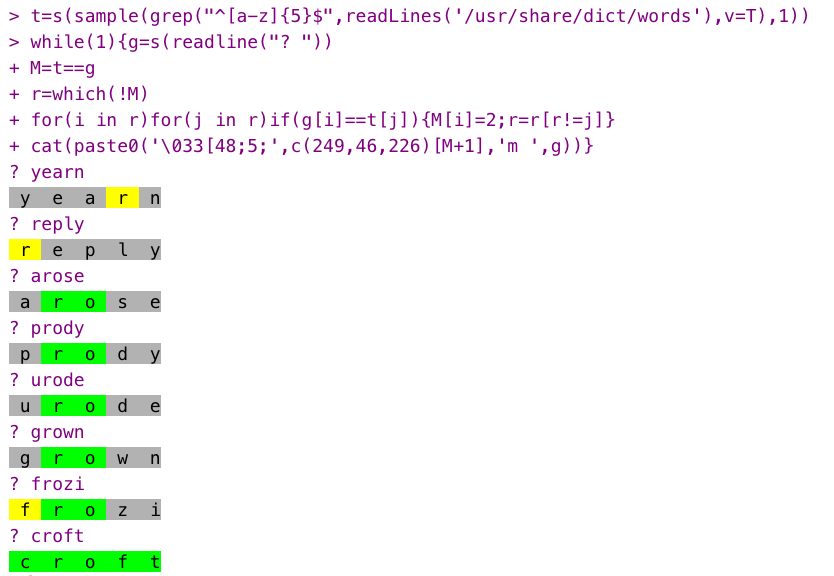wordle
The {wordle} package contains code to assist in finding good candidate
words for Wordle.
“Wordle” itself is a guess-a-word puzzle playable online.
The game plays like the old ‘mastermind’ board game, but with letters instead of coloured pins. The gameplay is as follows:
- Enter a word as a guess for the hidden target word.
- Any letters which are within the hidden target word are coloured in yellow.
- Any letters which match exactly the letter in the hidden target word are coloured green
- Figure out a new candidate word as a guess for the hidden target word, and go back to Step 1.
In the following game of Wordle, the first guess was eaten, the second was
arise, and then the third guess really only has one good option given the
constraints revealed so far: aside. This was the hidden target word,
which means the puzzle is solved!

The process of finding good candidate words given letters which have been seen so far is a good match for regular expressions. This package aims to help you find these good candidate words.
What’s in the box
play_wordle()Simple way to play a game of wordle in the R consolewordle_dictan ‘official’ list of words scraped from the Wordle websiteWordleHelperR6 Class is the primary way of finding candidate words. It has the following methods:$new()to start a new object to help with a new puzzle.$wordsto get a list of all the remaining possible valid words given the words and responses that have been seen so far$update()to notify the object of what the latestwordwas, and the colour responses received back from the game for each letter.- The
WordleHelperclass is a stateful wrapper aroundfilter_words()
Advanced:
filter_words()is a stateless function for filtering a list of words by various constraints on letter position.WordleGameR6 class represnting a wordle game engine$new()to create a new game and internally choose a target word for this game$try(word)to try a word and see what the respnse is in relation to the hidden target word$share()create a block of unicode representing the evolution of the solution process.play_wordle()is a simple helper function wrapping this class.
Installation
You can install from GitHub with:
# install.package('remotes')
remotes::install_github('coolbutuseless/wordle')Play a game of Wordle in your R console
wordle::play_wordle()
Help solve a puzzle with wordle::WordleHelper
In this example, after picking my favourite starting word, at each step I will just pick the first word in the alphabetical list of remaining possible words.

helper <- WordleHelper$new(nchar = 5)
length(helper$words)#> [1] 12972head(helper$words)#> [1] "aahed" "aalii" "aargh" "aarti" "abaca" "abaci"Initial word choice: arose
There are many opinions on a good starting word - I like: arose

Update puzzle state with the word played and the response:
helper$update("arose", c('grey', 'grey', 'grey', 'yellow', 'green'))
helper$words#> [1] "besee" "disme" "ensue" "esile" "fusee" "geste" "gusle" "issue" "istle"
#> [10] "lisle" "mesne" "piste" "pusle" "scene" "scute" "sedge" "segue" "seine"
#> [19] "seize" "selle" "semee" "semie" "sente" "shine" "shite" "shive" "shule"
#> [28] "shute" "sidhe" "sidle" "siege" "sieve" "since" "singe" "sithe" "sixte"
#> [37] "skene" "skite" "skive" "skyte" "slice" "slide" "slime" "slipe" "slive"
#> [46] "slype" "smeke" "smile" "smite" "snide" "snipe" "spice" "spide" "spike"
#> [55] "spile" "spine" "spite" "spule" "spume" "stede" "stele" "steme" "stile"
#> [64] "stime" "stipe" "stive" "stude" "stupe" "style" "styme" "styte" "suede"
#> [73] "suete" "suite" "sujee" "swede" "swile" "swine" "swipe" "swive" "sybbe"
#> [82] "sycee" "sythe" "teste" "unsee" "upsee" "usque" "visie" "visne"Choose the first word: besee

Update puzzle state with the word played and the response:
helper$update("besee", c('grey', 'yellow', 'yellow', 'grey', 'green'))
helper$words#> [1] "esile" "scene" "siege" "sieve" "skene" "smeke" "stede" "stele" "steme"
#> [10] "suede" "suete" "sujee" "swede" "sycee"Choose the first word: esile

Update puzzle state with the word played and the response:
helper$update("esile", c('yellow', 'yellow', 'yellow', 'grey', 'green'))
helper$words#> [1] "siege" "sieve"Choose the first word: siege

Success!
Optimizing word selection
In the above worked example no effort was made to optimize the word choice - instead the first word in the alphabetical list of remaining words was chosen.
There may be opportunities to pick the “best” word that helps to solve the puzzle faster, but no such code is included in this package - yet!
For example, it may be possible to pick the word that when played results in the most other words in the remaining list of words to be eliminated.
Tweetable Wordle Game Engine
A playable game of Wordle in a tweet.
This was an exercise to see if I could simplify the WordleGame into just 280 characters. It’s mostly unreadable, and lacks safety checks, but it works!
#RStats #wordle in a tweet
s=\(x)el(strsplit(x,''))
t=s(sample(grep("^[a-z]{5}$",readLines('/usr/share/dict/words'),v=T),1))
while(1){g=s(readline("? "))
M=t==g
r=which(!M)
for(i in r)for(j in r)if(g[i]==t[j]){M[i]=2;r=r[r!=j]}
cat(paste0('\033[48;5;',c(249,46,226)[M+1],'m ',g))}
Expert Function: filter_words()
The WordleHelper R6 class is just a stateful wrapper around a core function
called filter_words().
In general you wouldn’t need to call this function for solving a Wordle puzzle but it might come in handy for other word puzzles.
In this example, I’m searching for a word:
- with 9 letters
- starting with
p - containing
vandzsomewhere, but not as the first letter - containing only one
z - without an
aor anoin it
words <- readLines("/usr/share/dict/words")
filter_words(
words = words,
exact = "p........",
wrong_spot = c("vz", "", "", "", "", "", "", "", ""),
min_count = c(v = 1),
known_count = c(z = 1, a = 0, o = 0)
)#> [1] "pulverize"